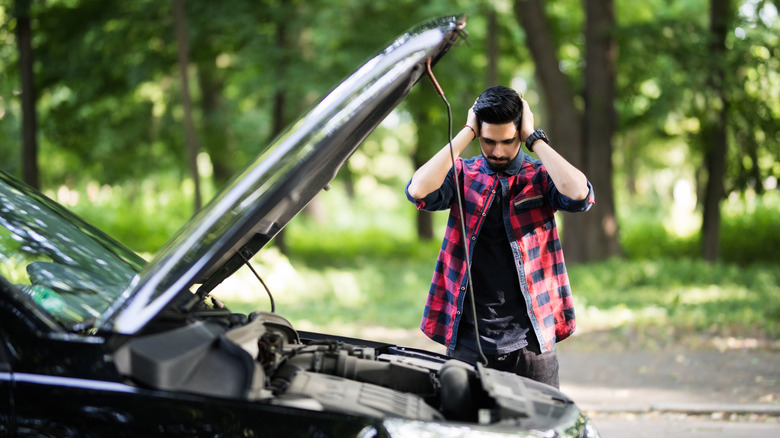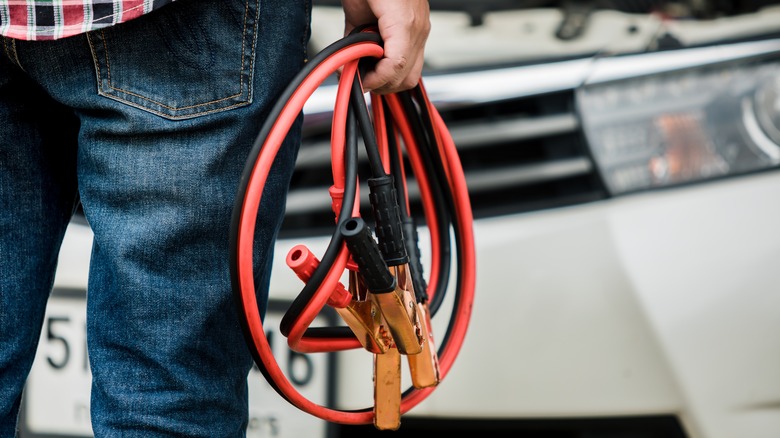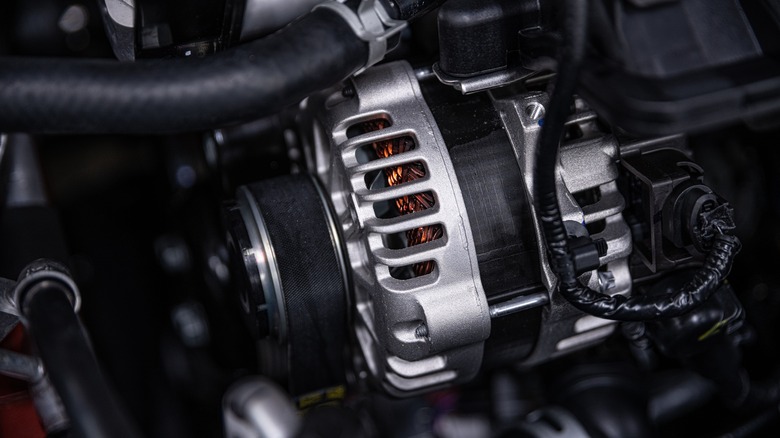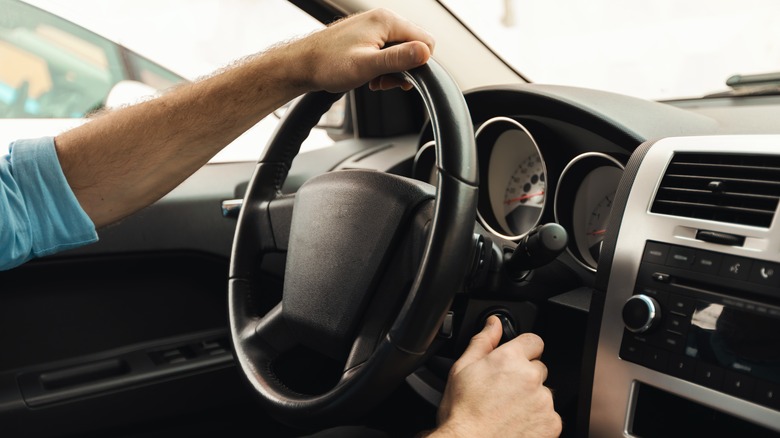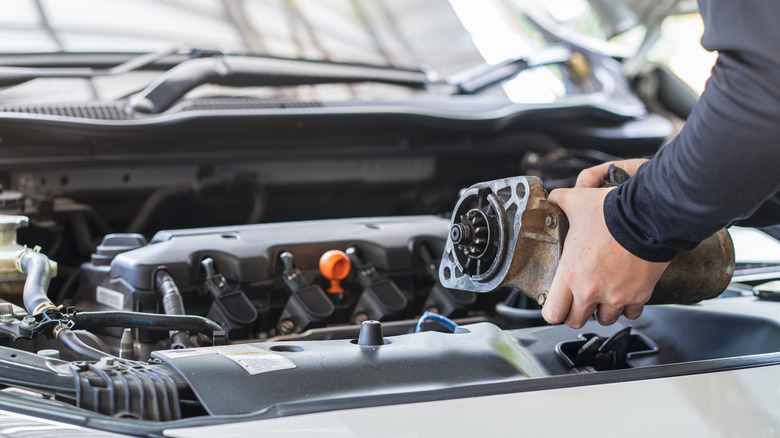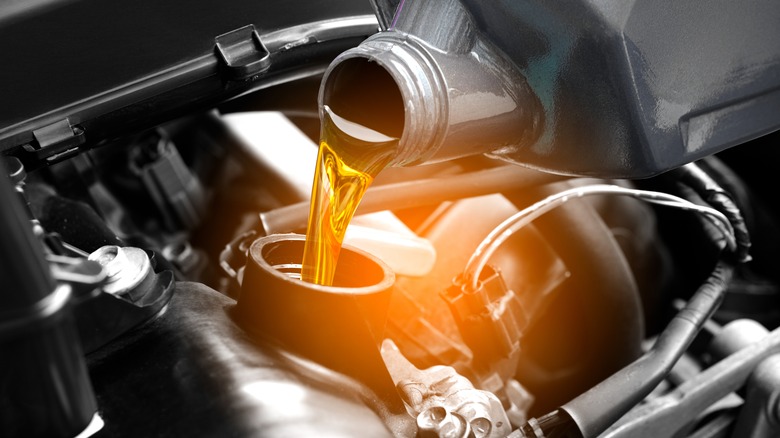5 Common Reasons Why Your Car Won't Start
We've all experienced it at one time or another: You put the key in the ignition, and nothing happens. You're met with silence or maybe a faint click, but there's no sign of the engine cranking and coming to life. It's one of the most frustrating experiences drivers have to deal with, and it seems to happen at the most inopportune times — you're late to work or at a location far from home. Whatever the case may be, you're stuck, and you're going nowhere fast. You probably immediately start racking your brain for a solution that'll help you get out of this bind.
Questions about whether your battery has died on you might pop into your mind. Did you forget to turn off your headlights, or could it be something more serious like a faulty alternator or starter? Figuring out what's going on can help you decide whether you need to use your iPhone's satellite roadside assistance with AAA to call for professional help or if it's something that can be handled with a quick jump start from a good samaritan or a portable car battery charger if you have one with you. Being familiar with the common reasons your car won't start can help you diagnose the issue quickly and get back on the road as soon as possible.
Dead battery
As you might have guessed, a dead or faulty battery is the most common culprit behind a car battery not starting. Your car's battery provides power for the starter motor, ignition system, and other critical components. As you can imagine, if your battery is dead, your car's electrical system isn't going to work. That's why you're met with silence or just a click when you turn the key if your battery is dead.
There are a few clues you can look for to determine if your battery is dead, such as the engine not cranking when you turn the ignition key, and all you hear is a clicking sound. Other signs are the dashboard lights being dim or completely off, your headlights being dim or not turning on, or the battery warning light on your dashboard being illuminated while the car is running. If you've concluded your battery is the problem, you might be able to jump your car's battery using another vehicle that has a fully charged battery. A jump start can get you back on the road, but it's a temporary solution. You'll want to get your battery tested to determine if you need to replace it.
Alternator issues
The first thing that crosses your mind when your car won't start is probably the battery. However, sometimes the issue isn't that straightforward, and a bad alternator could contribute to the problem, too. When your car's engine is running, the alternator powers the electrical system, including the lights, audio system, and power windows, guaranteeing your vehicle has enough power to start the next time you turn the key or push the start button. While a dead battery doesn't necessarily equal a bad alternator, the two work closely together. So, if the alternator is on its last legs, it may not charge the battery, making it impossible to start your car.
Your alternator will usually give you a few clues before it stops working, so if you know what to look for, you can often catch problems early. Things like difficulty starting your car, frequent stalling, dimming or flickering lights, electrical failures, and strange sounds are all early warning signs. Even if your car starts, a failing alternator may be unable to keep the battery charged, which might cause your vehicle to stall out and not restart.
Faulty ignition switch
Your car's ignition switch plays an important role in starting your vehicle by activating the main electrical systems that get the engine up and running. Turning the ignition switch lets the battery know it should send power to the starter motor, which then turns the engine over. A faulty ignition switch can cause a range of problems that prevent your car from starting or cause it to operate poorly.
If you have a bad ignition switch, you may find it hard to turn your key, or it may get stuck in the ignition. Another symptom is you turn the key, and the engine doesn't crank at all. Sometimes, the engine may start but stall as soon as you try to drive off. If you experience sporadic loss of lighting or dashboard lights flickering, that could also signal a problem with the ignition switch.
A smoky or burning smell might also be present in your car if the ignition is the problem. If you suspect a faulty ignition switch is why your car won't start, the first step is getting a diagnosis from a certified mechanic. Replacing the ignition switch is often the best solution if it is faulty. For most people, this won't be a DIY job because it involves working with the steering column and your vehicle's electrical system.
Defective starter motor
The starter motor is the part of your car's ignition system responsible for turning the engine over and initiating the combustion process that starts your vehicle. It works by engaging a gear with the engine's flywheel to turn the crankshaft, creating the necessary movement to start the engine. If your starter motor isn't working correctly, your engine won't start when you turn the key. You want to rule out any problems with your battery and make sure it's fully charged and working correctly because a weak battery can mimic starter issues.
A quick way to do this is to try to start the engine and see if the dashboard lights come on; if the lights come on but the engine doesn't start when you turn the key, your starter may be the problem. Another sign you may be dealing with a starter issue is if you hear a clicking noise when you turn the key or push the start button, which indicates the starter gear isn't engaging.
However, keep in mind that you won't always hear a noise before your starter dies. If your engine turns over more slowly than usual, it could be a sign your starter isn't providing enough power to your engine. If you notice smoke or a burning smell while trying to get your car to start, that may also mean your starter isn't working. If you determine your starter is the issue, you'll need to have your car towed to an auto repair shop.
Fuel system problems
If your engine cranks but fails to start, a fuel system problem such as a clogged fuel filter, a failed pump, or blocked fuel injectors could be to blame. These issues can prevent the right amount of fuel from getting to the engine to start your car. One of the most common fuel system problems is a clogged fuel filter. Your car's fuel filter performs the important task of cleaning the fuel of debris and contaminants before it reaches the engine. When it becomes clogged, it can restrict the fuel flow to the engine, keeping it from starting. You should change the filter every two years or 30,000 miles to prevent this. However, if you frequently drive through construction areas or on unpaved roads, you may need to change your filter more often to keep it in good working order.
The fuel filter isn't the only thing that can become clogged; your car's fuel injectors can also get blocked with debris, keeping the engine from receiving enough fuel, which can keep your car from starting. Another common fuel system problem is a malfunctioning fuel pump. The fuel pump supplies fuel from the tank to the engine at the correct pressure. When this goes wrong, it can't deliver the necessary fuel to the engine, which can lead to starting problems. If none of the above are the culprit, you may be dealing with leaks in the fuel system, which could lead to a loss of pressure, affecting the engine's ability to start.
